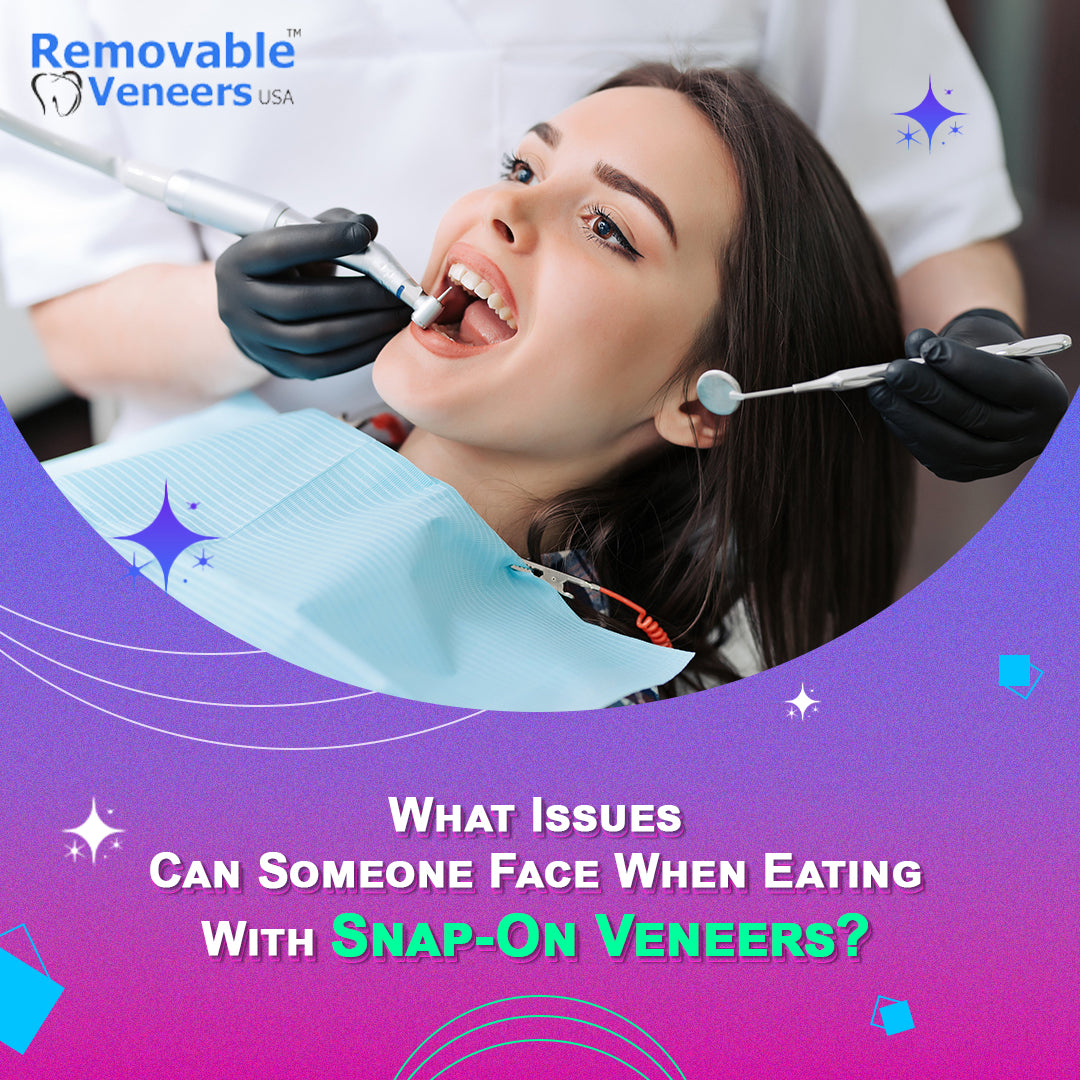Denture veneers are dental prosthetics used to cover the visible surface of natural teeth or dental implants designed to improve the appearance of a person's smile. Approximately 15 percent of American adults get dentures every year because they are designed to look like natural teeth and can be used to correct a variety of dental issues, such as gaps, stains, or misaligned teeth. Denture veneers are extremely durable, made of acrylic resin or a combination of acrylic resin and other materials such as porcelain. These materials are chosen for their durability and ability to go through the wear and tear of everyday use, making them the best snap-on veneers you can eat with.
The acrylic resin is strong and can withstand the pressure of biting and chewing, while the porcelain provides a natural-looking appearance. The best veneers online are also typically reinforced with a metal framework for added strength and durability.
What Issues Can Someone Face When Eating With Snap-On Veneers?
When eating with denture veneers, it's important to note that they are not as durable as natural teeth and may be more prone to wear and damage. To ensure that the veneers last as long as possible, dentists may suggest avoiding hard, crunchy, or sticky foods and overly hot or cold foods, as they may cause damage to the denture veneers.
They may also recommend cutting food into small pieces and chewing on both sides of the mouth to distribute the bite force evenly. Additionally, they may suggest regular dental checkups and cleaning to ensure the veneers are in good condition.
It's also crucial to see if the veneers fit properly over your natural teeth every once in a while. Hence, it's important to chew on both sides of the mouth to distribute the pressure evenly and avoid any shifting or dislodging of the veneers.
You should also visit your dentist regularly to ensure that your denture veneers are still fitting well and not showing any signs of wear and tear. This will help ensure that you can continue eating confidently and enjoy all your favorite foods.
What Kind Of Foods Can I Eat With Denture Veneers On?
When eating with denture veneers on, it is important to be mindful of the types of foods that you are consuming. Hard or crunchy foods can damage or chip the veneers. Similarly, sticky foods like caramel or chewing gum can pull the veneers off the teeth.
Additionally, practicing good oral hygiene when wearing denture veneers is important. This includes brushing and flossing regularly and visiting your dentist for regular checkups and cleanings. If your denture veneers become damaged or loose, it is important to have them repaired or replaced as soon as possible to prevent further damage or discomfort.
Foods that you can eat with denture veneers:
Soft fruits and vegetables are easy to chew and won't damage the veneers.
Dairy products, such as yogurt, milk, and cheese, are all great options that are gentle on the veneers.
Fish and poultry are tender and easy to chew, making them a good choice.
Cooked grains like rice, pasta, and oats are easy to chew and won't damage the veneers.
Cooked legumes such as beans, lentils, and chickpeas are easy to chew and good for your overall health.
Foods that you should avoid eating with denture veneers:
Hard, crunchy, or sticky foods can damage or dislodge the veneers.
Chewing on ice can crack or chip the veneers.
Nuts and seeds are hard and can damage the veneers.
Caramel and toffees are sticky and can pull off the veneers
Highly acidic or spicy foods can erode or discolor the veneers over time.
Steps To Care For Your Denture Veneers
Since you always risk damaging your denture veneers, even your denture veneers need to have something similar to a skincare routine. To care for denture veneers while eating with them on, you should:
- Brush your denture veneers regularly: Brush your veneers at least twice a day with a soft-bristled toothbrush and mild soap or non-abrasive denture cleaner.
- Clean your veneers after eating: After each meal, rinse your veneers thoroughly with water to remove any food particles or debris.
- Avoid hard, and sticky foods: Hard and sticky foods can damage your veneers, so it's best to avoid them.
- Handle your veneers with care: Always handle your veneers with care to avoid cracking or breaking them.
- Soak your veneers overnight: Soak your veneers overnight in a denture cleaning solution to keep them clean and bacteria-free.
- Visit your dentist regularly: Visit your dentist regularly for checkups and cleaning to ensure your veneers are in good condition.
- Store your veneers properly: When not in use, store your veneers in a secure and dry place.
- Protect your veneers while sleeping: Wear a night guard to protect your veneers while you sleep, as it will help you avoid grinding and clenching your teeth.
If you've got the best veneers online, then they aren't too hard to maintain. You may have to put in a little more effort because you're making them work while you eat. With each meal you have, your denture veneers may go through some wear and tear. But the damage isn't too much if you follow the aforementioned care routine.
Get the Perfect Smile and Perfect Bite with Snap-On Veneers!
Removable Veneers USA smartly devised a costly and majorly effective alternative for teeth whitening or dental veneers. We have transformed the world of smiles with our expertise in the field, technology, and amazing work.
We provide the best snap-on veneers you can eat with, all below one thousand dollars. Very few clinics and companies can compare to this service for the sole reason that we provide the most affordable option.
If you have ever been insecure about your smile on a date or a family dinner in a restaurant, that won't be the case again. With Removable Veneers USA, you can eat almost everything you want without worrying about your smile or the veneers.

